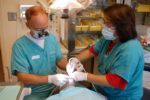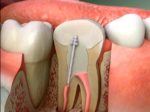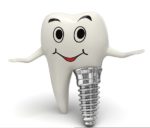It is obvious that most of us avoid dental visits because we tend to think about them as painful experiences. But what we don’t realize is that oral health is intricately linked with our overall physical health. Hence, it is best we get a clear idea about the types of dental surgeons and the various oral surgeries performed by these surgeons. This can help you understand certain commonly performed surgeries better and approach your dentist with a more relaxed and open mind frame. So let’s take a look:
 Types of Dentists / Surgeons:
Types of Dentists / Surgeons:
General dentists – They majorly focus on preventative oral care which helps you take care of your overall oral health. Though they may be capable of treating most of the oral health issues, they usually refer you to a dental specialist or oral surgeons such as the ones mentioned below:
Orthodontists – They are the ones responsible for rectifying incorrectly positioned jaw bones, teeth and other supporting facial structures for functional and cosmetic reasons.
Oral and maxillofacial surgeons – Soft tissues in and around the mouth such as gums, cheeks, lips, hard and soft palate, tongue and facial tissues are the areas of focus for these surgeons. The oral surgeon generally does the groundwork required for future dental work.
Periodontists – They help prevent, diagnose and treat various gum problems.
Prosthodontists – They are the ones which carry out your smile makeover which involves oral prostheses. These are often mandatory for both cosmetic and functional reasons.
Endodontists – Root canal is the most common surgery performed by endodontists. It is performed if the inner most part of tooth – the pulp is infected severely. To prevent the spread of decay and further damage, root canal surgery is performed.
Apart from these, there are also certified specialists in oral pathology, oral radiology and pediatric dentistry. Now that you are familiar with the various kinds of dental surgeons, let’s get familiar with the common types of surgeries and what you can expect from them –
- Dental Implant – As per the condition of your jawbone, the surgeon decides the nature of implants and the dental implant surgery is performed accordingly. This oral surgery is generally spread across stages and the entire surgical process may take up to some months.
- Endodontic or Root Canal surgery – Endodontic therapy is also commonly known as root canal. It involves removal of infected pulp to eliminate infection in order to prevent further damage to the surrounding teeth. It is an economical solution as compared to tooth extraction.
- Corrective Jaw / Orthognathic surgery – It is required when misaligned bite cannot be rectified with orthodontics. In some cases, to rectify birth defects or congenital abnormalities, surgical treatment becomes a must. The facial bones and jaw may be reshaped and repositioned and the jaws and the teeth realigned.
- Periodontal surgery – Periodontitis is a serious infection in gums which can eventually lead to loss of the jaw bones. So when this condition has advanced to the level where no basic form of treatment is useful, periodontal surgery is prescribed.
- Wisdom Tooth Extraction – Wisdom tooth removal or extraction is possibly one of the most common procedures performed by oral surgeons. When wisdom tooth or teeth erupt improperly or incompletely they cause jaw pain and this is when an extraction is recommended, so that the incorrectly aligned or erupted teeth don’t affect the surrounding teeth, gums and tissues.
- Oral and Maxillofacial surgery – These surgeries comprise complicated treatments or more invasive procedures associated with the hard and soft tissues of face, jaws and mouth.
- Cosmetic Dental Surgery – It involves procedures such as veneers, dental implants, crowns and fillings to correct and enhance the appearance of your smile. This oral surgery is also used to correct what is commonly referred to as a ‘gummy smile’.
- Cleft Lip & Cleft Palate Surgery – Improper development of fetus in the early stages sometimes leads to incorrect or incomplete growth of certain portions of the nasal and the mouth cavity. This results in a gap or a split in the lip, the roof of the mouth or both and is known as the cleft lip or the cleft palate. An oral surgery is usually prescribed to correct this deformity.
- Sleep Apnea Correction Surgery– If medications have failed to treat severe snoring or sleep apnea issues then your oral surgeon might recommend a surgery to correct these issues. The oral surgery for treating sleep apnea involves removal of a soft tissue located on the back of the mouth which is known as the lower jaw or the oropharynx.
Besides these, there are other oral surgeries as well which are used to treat disorders like Temporomandibular Joint or TMJ dysfunction, facial infections etc. Dentists and oral surgeons provide in depth guidance for pre and post oral surgery care so that you are able to get the best possible results from oral surgery.






